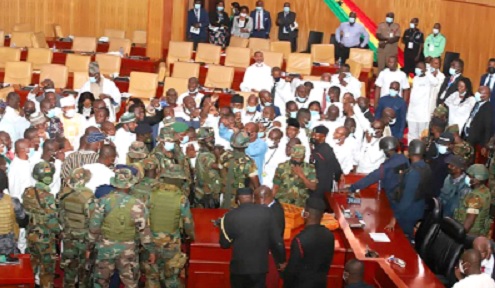
First hung Parliament in 4th Republic: Blessing or curse?
Results of the 2020 general election gave President Akufo-Addo the nod for a second four-year term but his New Patriotic Party (NPP) split the 275 parliamentary seats with the National Democratic Congress (NDC).
Advertisement
Each party obtained 137 seats but the NPP caucus secured one seat more from the Independent candidate to land a slim majority with 138 seats.
The stage, therefore, was set for an unprecedented historic hung Eighth Parliament of the Fourth Republic.
Expectations
While the NPP was licking its wounds over the massive loss of 32 seats to the NDC, the latter was gloating over its gains and relishing the prospect of a showdown with NPP in the Eighth Parliament.
The creation of a level-playing field raised high expectations among citizens that the Eighth Parliament was going to raise the bar of parliamentary democracy a notch higher in the supreme national, rather than parochial political party or personal interests.
This noble anticipation however turned out to be a pipedream right from the onset of the first sitting of the Eighth Parliament, judging from the rancorous commotion that characterised the election of the Speaker of Parliament.
The behaviour, of members in the House on this occasion (January 6 to 7, 2021) left a sour taste in the mouths of Ghanaians as to what the MPs had in store for this country’s democratic future.
Benefits
The NPP’s losses were NDC’s gains, but democracy was the winner.
Other Trending Stories
To the NDC, the days when NPP could ride roughshod over it with superior numerical advantage in Parliament were effectively over.
To all intents and purposes, it marked the launch of a new chapter that was going to invalidate the saying that “the minority can have its say, but the majority will have its way”.
Undoubtedly, NPP’s superior numbers in the Seventh Parliament largely facilitated the implementation of some social intervention policies such as the Free SHS, National Identification Card, One District One Factory, One District One Dam, One Constituency One Ambulance, among others, though the NDC strongly but legitimately contested their passage through boycotts and walk-outs.
The benefits or otherwise of these policies still occupy headline debates in the various political circuits.
Debates
NPP’s slender majority status stands on slippery grounds — the fact that quite a sizeable number of its MPs double as ministers and deputy ministers renders it vulnerable to reduced numbers in the House.
The NDC caucus occasionally exploits this situation to its benefit, though it can be said that the equal numbers on both sides are yet to be fruitfully utilised.
Gone are the days when MPs from both NPP and NDC could stand toe-to-toe to debate issues with well researched, intelligent, logical, persuasive submissions, complete with relevant supporting facts and figures, reminiscent of the feat that was admirably demonstrated by the 1996/2000 batch of MPs in the Second Parliament of the Fourth Republic.
Those were the days when the then Minority NPP gave the then ruling NDC a good run for its money on the floor of Parliament.
Belligerent
Lamentably, it seems the belligerent, rabble-rousing spirit which visited the maiden sitting of the Eighth Parliament on January 6 to 7, 2021, has been transported into the House and has comfortably taken root.
It is now fashionable for both sides to take entrenched, uncompromising positions on certain crucial national issues that require consensus building.
The walk-outs, boycotts, physical and verbal attacks, fisticuffs and other unparliamentary behaviour perpetrated by honourable members during deliberations on the E-levy and approval of the 2021 National Budget, for example, have seriously dented the image of the belligerent Eighth Parliament, leading to public loss of confidence and respect for the august house.
Solidarity
A recent worrying development, particularly with the Minority, is its decision to collectively abandon parliamentary business to support three of their colleagues anytime they appear before courts of law in Accra in connection with charges levelled against them.
Advertisement
Another noticeable trend, though not new, is the frequent rush by MPs from both sides to hold press conferences outside the House chamber to ventilate their grievances, concerns or defend their stance on matters which could otherwise have been sorted out within the House and could have been captured by the Hansard.
Sad to say some of these outside-the-Chamber engagements with the press have turned out to be unproductive public relations gimmicks, simply playing to the gallery.
Way forward
Recent unfortunate remarks by the First Deputy Speaker of Parliament, Joe Osei-Wusu that this Eighth Parliament is “the worst... so far since the inception of the Fourth Republic should jolt the House into conducting an honest and sincere self-introspection to spruce up its image.
It remains to be seen whether this exercise could be undertaken well before the Eighth Parliament is prorogued in the last quarter of 2024, but from the present scheme of things it very much appears that the itinerary towards this destination is a journey without maps.
The writer is a retired educationist.
E-mail: [email protected]
Advertisement




